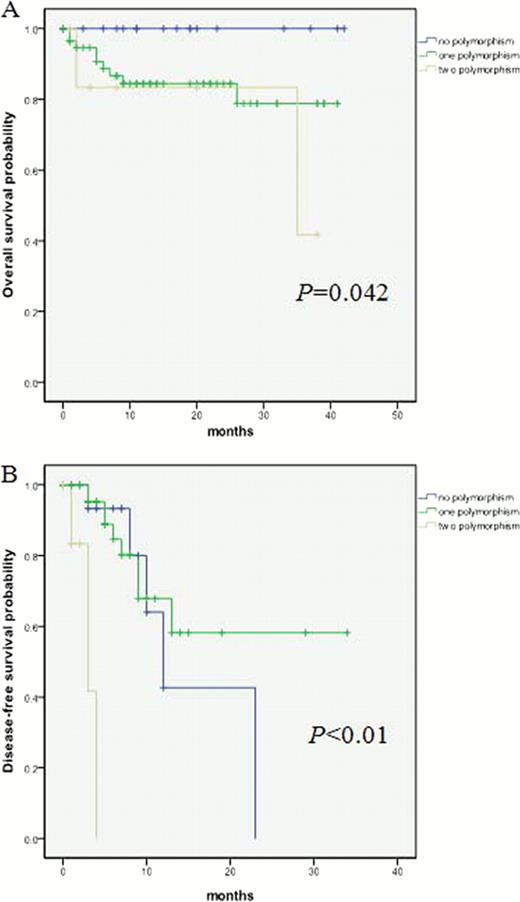Abstract
Abstract 3958
Recently, a striking example of the effects on acquired somatic mutations in splicing factors such as SF3B1, U2AF1, and SRSF2 has been described. The sequencing of the DNA from abnormal blood cells from patients with several types of leukemia such as AML, CLL, CMML, pre-leukemic syndromes, and MDS, has shown that a high proportion of these cases are associated with somatic mutations in spliceosomal proteins. Also, evidence of cancer-specific alternative splicing and oncogenic somatic mutations in spliceosome subunits has been steadily growing. However, there is not much research regarding aberrant splicing pathways in Multiple myeloma (MM) patients. Therefore, we tried to investigate the presence and prognostic implication of mutation of the SF3B1 and U2AF1 protein in these patients in South Korea.
We examined a cohort of 87 MM patients and 100 healthy controls for somatic mutations in SF3B1, U2AF1 and SRSF2 by using direct sequencing method. The medical records were reviewed for age, sex, plasma cell percentage, serum M protein, immunoglobulin level, free light chain ratio, calcium, creatinine, hemoglobin, bone lesion, albumin, beta 2 microglobulin, lactate dehydrogenase, treatment outcome, and so on. The collected data was analyzed by SPSS for Windows version 18.0. We performed Pearson's chi-square tests, one way ANOVA analysis, and Student t-test. Survival rates of myeloma patients according to the result of SF3B1, U2AF1 and SRSF2 sequencing were analyzed using Kaplan-Meier log-rank test.
Our 87 MM patients showed no mutation including known recurrent ones in SF3B1, U2AF1 and SRSF2 genes. However, the patients displayed 39198T>T/C polymorphism (70.1%) in exon 18 of SF3B1, 8345T>T/G polymorphism (13.8%) in exon 2 of U2AF1 and 5399C/T polymorphism (100%) in exon 1 of SRSF2. In the entire cohort, the number of patients with no polymorphism, one polymorphism, two polymorphisms and three polymorphisms was counted up to 0%, 24.1%, 67.8% and 8.0%, respectively. The T/C polymorphism at position 39198 of SF3B1 exon 18 and the T/G polymorphism at position 8345 of U2AF1 exon 2 were analyzed by allele-specific PCR using normal control. Results in 100 normal controls, polymorphism of SF3B1 exon 18 was taken into account of 82.0%, the remaining is non polymorphism while U2AF1 exon 2 showed 10.0% polymorphism and 90.0% non polymorphism. Sex (p=0.048) and free light chain ratio (p=0.002) showed significant results according to polymorphism status while other clinical characteristics were not associated. The patient with polymorphisms in both SF3B1 and U2AF1 had worse overall survival (P=0.042) and disease-free survival (P<0.01), compared to patients without polymorphism.
Our results show no recurrent SF3B1, U2AF1 and SRSF2 mutations in MM patients rather polymorphisms in SF3B1 and U2AF1 gene were significantly implicated in the prediction of poor prognosis.
Prognostic implication of polymorphisms in SF3B1 and U2AF1 gene. Polymorphisms in SF3B1 and U2AF1 gene were significantly implicated in shorter overall survival (A) and disease-free survival (B).
Prognostic implication of polymorphisms in SF3B1 and U2AF1 gene. Polymorphisms in SF3B1 and U2AF1 gene were significantly implicated in shorter overall survival (A) and disease-free survival (B).
No relevant conflicts of interest to declare.
Author notes
Asterisk with author names denotes non-ASH members.


This feature is available to Subscribers Only
Sign In or Create an Account Close Modal